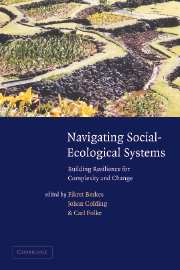Book contents
- Frontmatter
- Contents
- List of contributors
- Preface
- Acknowledgements
- Foreword: The backloop to sustainability
- 1 Introduction
- Part I Perspectives on resilience
- Part II Building resilience in local management systems
- Part III Social-ecological learning and adaptation
- Part IV Cross-scale institutional response to change
- Index
- References
1 - Introduction
Published online by Cambridge University Press: 13 August 2009
- Frontmatter
- Contents
- List of contributors
- Preface
- Acknowledgements
- Foreword: The backloop to sustainability
- 1 Introduction
- Part I Perspectives on resilience
- Part II Building resilience in local management systems
- Part III Social-ecological learning and adaptation
- Part IV Cross-scale institutional response to change
- Index
- References
Summary
Building capacity to adapt to change: the context
A common perspective until recently was that our problem-solving abilities have been improving over the years. In the area of resource and environmental management, for example, there was a great deal of faith in our growing scientific understanding of ecosystems, our bag of increasingly sophisticated tools and technologies, and the application of market mechanisms to problems such as air pollution control and fishery management through individually allocated quotas. However, the experience over the last few decades does not support such optimism (e.g., Clark and Munn, 1986; Ludwig, Hilborn, and Walters, 1993; Gunderson, Holling, and Light, 1995). Many of our resource and environmental problems are proving resistant to solutions. A gap has developed between environmental problems and our lagging ability to solve them. This is coming at a time when the Earth has become an increasingly human-dominated system. Many of the changes in the biosphere, including the modification of landscapes, loss of biodiversity and, according to some, climate change, are driven by human activities. Furthermore, changes are occurring at an increasingly faster rate than previously experienced in human history.
There is an emerging consensus regarding the need to look for broader approaches and solutions, not only with resource and environmental issues but along a wide front of societal problems. A survey of senior American Association for the Advancement of Science (AAAS) scientists revealed an intriguing insight.
- Type
- Chapter
- Information
- Navigating Social-Ecological SystemsBuilding Resilience for Complexity and Change, pp. 1 - 30Publisher: Cambridge University PressPrint publication year: 2002
References
- 19
- Cited by

